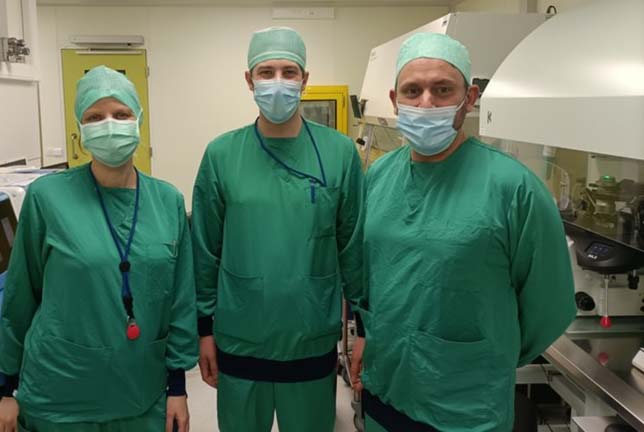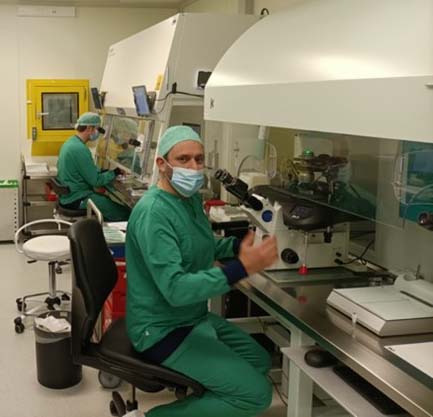How the RI Witness™ solution with IQ can help improve standards and clinical outflow in a large fertility clinic

How the RI Witness™ solution with IQ can help improve standards and clinical outflow in a large fertility clinic
An interview with Johan Sterckx, Lab Quality Manager, Brussels IVF of UZ Brussel, Belgium
The implementation of RI Witness electronic witnessing system into fertility clinics is playing a key part to help improve laboratory performance through sample safety and quality control.
We spoke with Johan Sterckx who has implemented the RI Witness upgrade, RI Witness IQ at Brussels IVF on the challenges that face a large fertility clinic who accumulate a lot of data and how RI Witness IQ can support a large data output and provide meaningful analysis and insights for more advanced fact-based laboratory management.
Johan Sterckx is the Lab Quality Manager of Brussels IVF in Belgium since 2019. He has a background in biomedical sciences and has worked at Brussels IVF since 2004, trained in various proficiencies within the lab and assisted in quality management duties.
Can you tell us about Brussels IVF and your role as Quality Manager?
Brussels IVF started in 1983 and has been at the forefront of innovative reproductive treatment. Today, we are the largest fertility clinic in Belgium with a staff of more than two hundred people, and a total of forty-five clinical embryologists and lab technicians working inside the lab performing all the ART procedures.
Last year (2021), we had around 5600 egg collections, so to run and monitor all those lab procedures in such a large clinic, we have a very robust quality system in place. My role is to maintain the highest level of standards within the lab; set up standard operating procedures (SOPs) and quality controls, monitor key performance indicators (KPIs) and manage the RI Witness system and much more. My job is quite extensive, and that makes it very interesting for me.
“It is important to offer our patients the best possible treatment and we work hard to keep our standards as high as possible.”
Can you talk about the role of RI Witness in your lab?
We just passed our 10th anniversary using RI Witness. Research Instruments presented it to us during the developmental stage prior to their acquisition by CooperSurgical, so we’ve been fortunate to have had access from the very beginning. Its ability to follow the journey of identified patient samples in the lab has been an important safeguard; to help prevent errors, but also to take away a lot of double-checks, allowing us to eliminate the second manual ‘witness’ in many steps in our lab.
It is important to offer our patients the best possible treatment and we work hard to keep our standards as high as possible. RI Witness plays an important role in this and with the size of our workload, we can no longer work without it. I’ve recently submitted an ESHRE abstract documenting the lessons we’ve learned over these many years and I’m excited to share those insights with the fertility industry very soon.
How has RI Witness IQ further improved quality management in the lab?
As a Quality Manager, I’m also responsible for collecting and managing data and using it to help improve workflow. A major challenge for a bigger clinic like Brussels IVF is that we automatically generate a lot of data and retrieving and analyzing this data is not always that evident. We started working with RI Witness IQ around two years ago. With its easy-to-navigate dashboard, we now get to analyze the data from different parts of the lab journey. I can check the number of mismatches, procedure timings and get an overview of lab staff ways of working. RI Witness IQ also generates monthly reports, which I can share with my embryologists and lab management to discuss possible workflow issues or performances.

“A major challenge for a bigger clinic like Brussels IVF is that we automatically generate a lot of data and retrieving and analyzing this data is not always that evident.”
What else are you excited about in the lab with RI Witness IQ?
In the witness points diagram, I was able to change existing witness points to get a more detailed overview of lab workflows in specific areas and want to continue to expand that even more. As a user, I appreciate the simplicity in the easily programmable dashboard, so I can see the data I’m interested in and can modify it when I want to focus on another area of interest.
The advantage of access to real-time data is the ability to turn data insights into action. In the past, some lab insights we would only receive or check in a yearly review and now, I can look at these numbers and adjust accordingly. In the future, RI Witness IQ will become more integrated and utilized as a quality control tool and to cut down on some of the manual processes on my administrative time too. RI witness IQ creates a great opportunity to utilize the data previously hidden in the system.
The real-time data can have a direct impact on lab performance.
Yes, real-time data is quite important. In just a few clicks, we can have the timings calculated by RI Witness IQ but another feature I’m impressed with is the access to time measurements between procedures. RI Witness IQ can calculate the elapsed time from one witness point to another and for us, this is the first time that we have real and accurate timings of procedures.
I’m using RI Witness IQ more for those insights, to see how long an ICSI procedure takes, for example. There are always outliers in the lab, and some ICSI cases are more difficult than others and will take more time due to their complexity or bigger number of oocytes, but by looking into data around timings, we also see timing differences between lab staff.
For us, the best way to use an electronic witnessing system is to label samples before any manipulation is done to prevent an eventual error. Now with RI Witness IQ, we can correct protocol deviations more quickly since we can see some inconsistent timing results that may indicate that an operator didn’t use the system as required.

“…to standardize procedures, it’s even more crucial that we utilize our data and show the lab staff our KPIs and how small deviations in timings between lab staff can make a difference.”
Can RI Witness IQ be an influential tool for lab standardization?
Standardization inside the lab is important, but 100% standardization is not always achieved. There will always be some small yet sometimes acceptable variations between the different operators. Therefore, to standardize procedures, it’s even more crucial that we utilize our data and show the lab staff our KPIs and how small deviations in timings between lab staff can make a difference.
Data insights can also help with training our lab staff. If somebody is not working smoothly, you’ll see it because it takes more time to do something compared to others, so we can now follow those inconsistencies more closely. Of course, we give our new staff some time to get the necessary experience, but if someone is working for one or two years and not improving, then it’s time for us to consider stepping in with more training.
“Real-time data without having to do a big analysis of what’s happening saves me time.”
In summary, why should clinics implement RI Witness IQ into their lab?
With RI Witness IQ, we get to see the real procedure timings per operator and within the procedure itself. To see the timings and get to investigate more thoroughly is an added value where we can see the impact immediately.
From the administrative side, I’m drawn to the dashboard’s quick overview. I can directly see in RI Witness IQ the data points I want to see. Real-time data without having to do a big analysis of what’s happening saves me time. For lab management, having easy access to these data points can help support us as a clinic in certain decision-making, so that we can continue to work to the highest standards.

 My Clinic is in the United States
My Clinic is in the United States My Clinic is in Canada
My Clinic is in Canada

